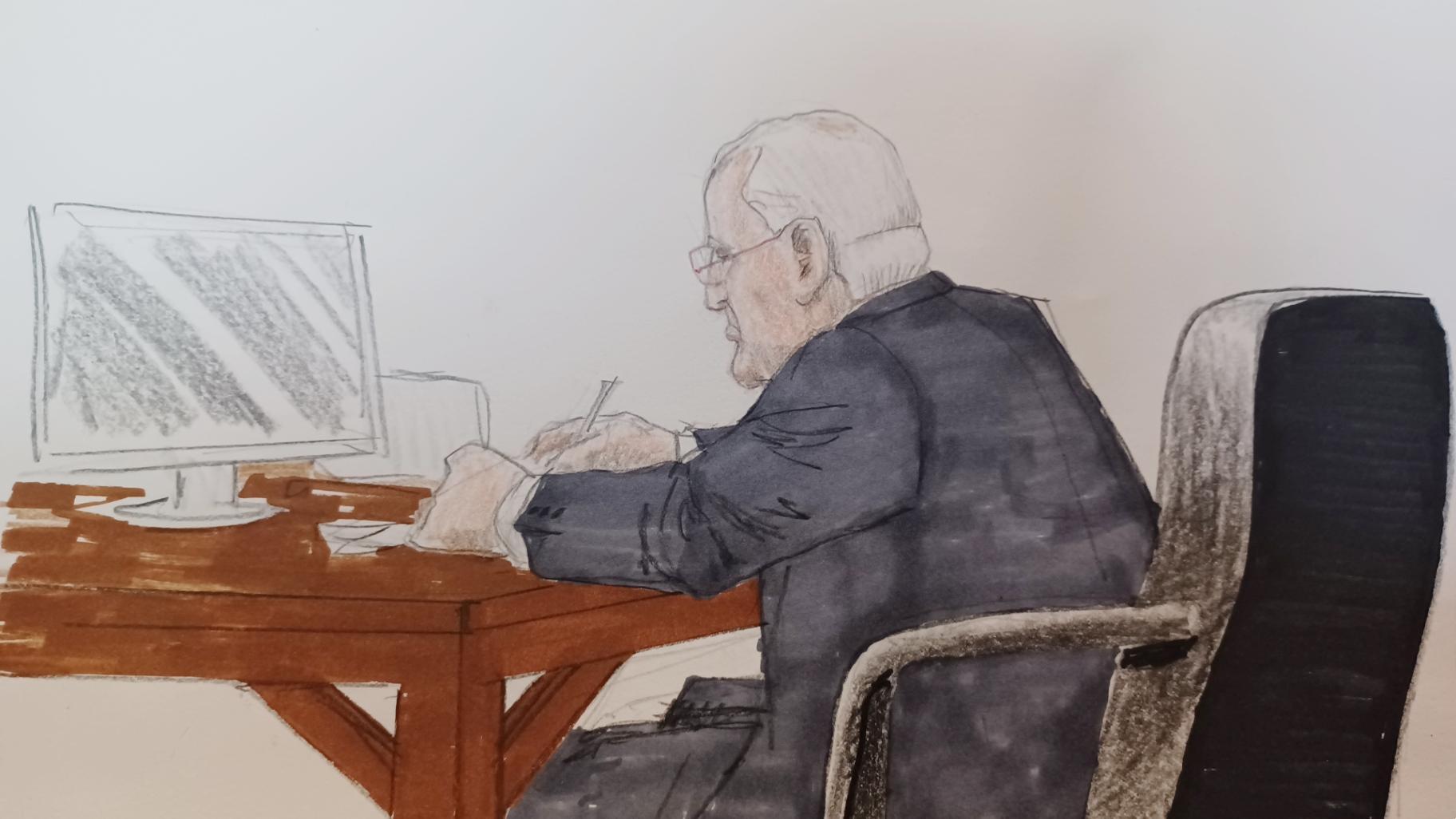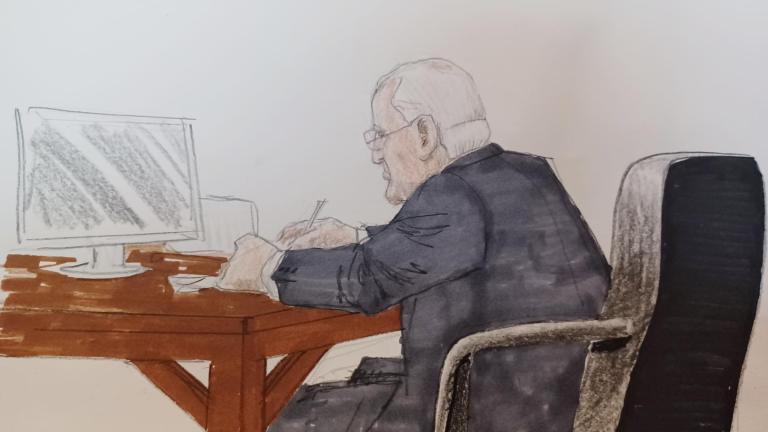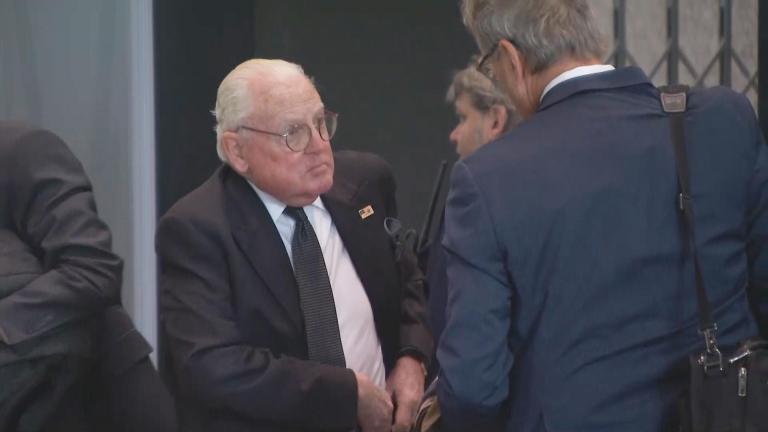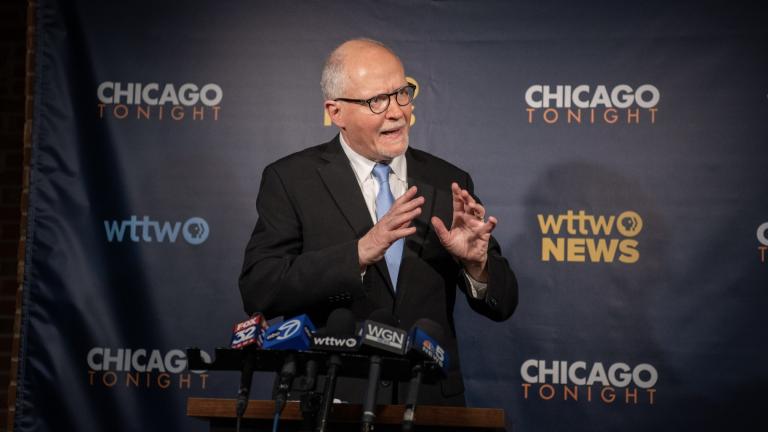 Former Ald. Ed Burke in federal court before U.S. District Court Judge Virginia Kendall on Dec. 5, 2023. (WTTW News)
Former Ald. Ed Burke in federal court before U.S. District Court Judge Virginia Kendall on Dec. 5, 2023. (WTTW News)
Lawyers for former Ald. Ed Burke urged U.S. District Court Judge Virginia Kendall to toss out his racketeering conviction, saying the jury in his landmark corruption trial got “carried away.”
After the three-hour hearing, Kendall declined to issue a ruling immediately, instead promising a written order “shortly.”
Sporting a pinstriped suit, a green tie and a Kelly green pocket square, Burke spoke only to greet Kendall and appeared to take notes on a yellow legal pad throughout the hearing. Two of his children attended the hearing, as did his wife, former Illinois Supreme Court Justice Anne Burke.
Burke, 80, was convicted Dec. 21 on 13 of 14 counts of racketeering, bribery and attempted extortion. He is set to be sentenced June 24.
Defense attorneys routinely ask judges to toss out their client’s convictions before sentencing and must do so if they plan to appeal the jury’s decision. Judges rarely overturn jury verdicts.
Arguing on behalf of Burke, attorney Chris Gair focused his arguments on three of the four criminal schemes he was convicted of orchestrating.
If Kendall agrees with him, that would likely threaten the basis for a racketeering conviction, since that charge must include a finding that Burke conducted or participated in a pattern of racketeering activity.
“Jurors can get carried away,” Gair said.
But three federal prosecutors spent nearly 90 minutes rebutting Gair’s arguments, arguing that the jury determined that Burke operated at City Hall like a mafia don, shaking down those who needed or desired an official action from their elected leaders, and convicted him of racketeering, a charge usually brought against members of the mob or street gangs.
“The defense just doesn’t like the outcome,” said Assistant U.S. Attorney Sarah Streicker. “There is no error here.”
In particular, Gair argued that the jury’s decision to convict Burke of attempted extortion for threatening to block a fee increase at a museum in 2017 because officials didn’t agree to hire a friend’s daughter as an intern was unreasonable.
The jury agreed with prosecutors that Burke intervened to help the daughter of former Ald. Terry Gabinski (32nd Ward) get a job at the Field Museum. Eventually the fee hike was approved, and Gabinski’s daughter never took a job at the museum.
That scheme has long been considered the weakest of the charges facing Burke, and his lawyers unsuccessfully asked Kendall to toss those charges out before they were considered by the jury. Kendall declined, even after calling the charge “an extremely odd attempted extortion count.”
Gair renewed those arguments Wednesday, telling Kendall the jury erred in finding Burke’s bad behavior in a phone call with a museum official was criminal.
“What really happened there was he blew up in anger over being disrespected and he said something that was profoundly obnoxious,” said Gair, who also argued that Burke sought no financial benefit from museum officials, saying the prospect of a job for his friend’s daughter had no financial value.
Gair and Burke’s other lawyers made similar arguments during closing arguments.
“The fact is, Mr. Burke made his case to a jury and the jury rejected it,” Streicker said.
Gair also argued that jurors erred when they decided Burke engaged in an official action — a necessary finding to convict a public official of bribery or attempted bribery — by asking officials to help clients of his property tax appeals firm.
The most elaborate scheme Burke was convicted of engaging in involved the Old Post Office, the massive building that straddles the Eisenhower Expressway at the edge of the Loop.
Vacant for nearly 25 years after the departure of the U.S. Postal Service, the landmark’s fortunes began to reverse when the building was purchased by New York-based 601 West Companies, which planned to spend $800 million to renovate the massive structure into offices.
But the firm ran into problems restoring the building’s water service, prompting Burke to reach out to a former commissioner of the Chicago Department of Water Management, who in turn contacted the commissioner at the time.
Burke was also convicted of accepting bribes from Charles Cui, a Portage Park businessman who transformed a long-vacant Six Corners bank building into a Binny’s Beverage Depot, Culver’s and gym.
After city officials denied Cui’s request for a large pole sign outside the former bank, he bribed Burke to get a permit for the sign and then lied to FBI agents, according to officials.
Burke reached out to two city officials and asked them to examine the issue of the pole sign, according to testimony.
But none of those officials testified that Burke demanded they act, Gair told Kendall.
“If all the witnesses say ‘There was no pressure,’ the jury is not entitled to find there was pressure,” Gair said. “It’s that simple.”
But Assistant U.S. Attorney Diane MacArthur said it wasn’t quite that simple, since Burke’s status as the chair of the Finance Committee and the most powerful member of the Chicago City Council was well known to everyone involved.
“Mr. Burke was shrouding himself with the power that he had in the city of Chicago,” MacArthur said.
Cui was convicted on five charges, and is set to be sentenced in July.
The jury verdict that delivered a searing indictment of Chicago’s political system capped a six-week trial, which included testimony from three dozen witnesses and 100 recordings made as part of a court-authorized wiretap and undercover efforts by disgraced former Ald. Danny Solis (25th Ward).
Some of Burke’s turns of phrase recorded on those tapes immediately became an indelible part of Chicago’s long history of political corruption, and the jury is likely to hear Burke ask Solis, “So, did we, uh, land the tuna?”
Burke was also recorded cautioning Solis not to act because “the cash register has not rung yet.”
Contact Heather Cherone: @HeatherCherone | (773) 569-1863 | [email protected]






